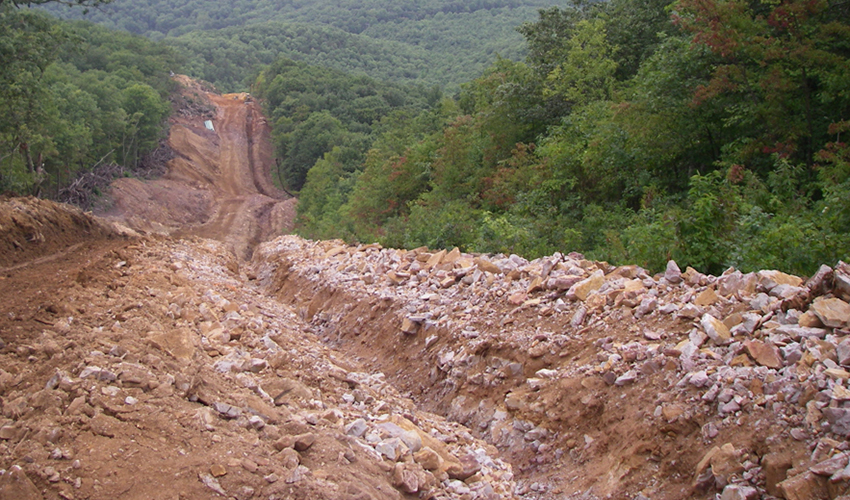What is the ACP?
The Atlantic Coast Pipeline (APC) is a natural gas pipeline project that has been proposed by Dominion Resources, Duke Energy and their partner companies. It would carry natural gas from the Marcellus Shale field in central West Virginia through Randolph and Pocahontas Counties, into Virginia through Highland, Bath, Augusta, Nelson and Buckingham Counties, and then on to southeast Virginia and terminating in southeast North Carolina. The major rationale for the project, as announced in September 2014 when the project was first proposed, is that there is an abundant supply of natural gas that needs to be carried to electric utility plants in the southeast that need a cleaner fuel to replace coal as a generating fuel. It is further claimed to be a benefit to the affected communities because it would create jobs and economic benefits.

The Project’s Status
The Federal Energy Regulatory Commission (FERC), with input from cooperating federal agencies (e.g. National Forest Service, Department of Interior and others), will make the final decision on whether the pipeline receives a permit to be built. FERC is currently receiving comments on a Draft Environmental Impact Statement (DEIS) to help the agency determine whether the project merits approval. The comment deadline is April 6, 2017. More information on the DEIS is available at www.abralliance.org.
The Issues
The proposed pipeline, 600 miles in length, would be 42 inches in diameter, requiring excavation of an 8 to 12-foot-deep trench and a 125-foot-wide construction corridor. It would traverse steep mountain slopes and fragile karst topography, presenting a potential hazard to regional water supplies but without benefit to the communities and citizens it would affect.
The Allegheny-Blue Ridge Alliance, a coalition of 51 organizations in Virginia and West Virginia, disputes the avowed need and appropriateness for the APC because:
-
- The ACP is not needed to assure needed future energy supplies. Numerous studies have been conducted, including some by the Federal Government and industry, that conclude there is sufficient capacity in existing pipelines. Furthermore, building new pipelines would be further unnecessary in the longer term because renewables (wind and solar) are the predominate source of new generating capacity being built in the nation.
-
- The ACP would not bring jobs and economic benefits to affected communities. The people hired to construct the pipeline would not be local to VA, WV or NC, but would be contracted help from outside the area. The permanent positions created would be miniscule compared to the jobs permanently lost due to businesses that would be disrupted, particularly in the tourism industry. Further, depressed property value and reduced demand for affected real estate would adversely affect localities.
-
- The ACP would devastate the environment of one of the nation’s important ecosystems.
- Threaten the integrity and safety of water supplies in the immediately affected communities and other communities that are dependent upon water originating in the Allegheny-Blue Ridge region;
- Endanger the structural character and seriously increase the possibility of long-term erosion in the steep mountain terrain through which the routes would pass;
- Present serious safety risks because of the proven instability of the karst topography that these proposed routes would traverse, as well as the danger of pipeline failures;
- Harm the habitat of many protected and unique species of plants and animals;
- Compromise the intended uses of public lands, particularly the Monongahela and George Washington National Forests; and
- Degrade the usefulness of affected agriculture and forest resources.
- The ACP would devastate the environment of one of the nation’s important ecosystems.
-
- Deprive, by using eminent domain for private gain, people of their property rights.
Those who wish to comment on the Draft Environmental Impact Statement are urged to do so by April 6, 2017 by writing the Federal Energy Regulatory Commission. Indicate that comments regard Docket No. CP15-554. Send them as follows:
| Electronically: http://www.ferc.gov/resources/guides/how-to/ecomment.asp | |
| U.S. Mail: | Kimberly D. Bose, Secretary Federal Energy Regulatory Commission 888 First Street, NE Washington, DC 20426 |
Be sure to send copies to your Congressman and United States Senators. They need to hear what you think of the proposed Atlantic Coast Pipeline.
For further information, contact:
Lewis Freeman, Chair & Executive Director
540-468-2769 (o/h) or 703-298-8107 (c)
www.abralliance.org PO Box 685, Monterey, VA 24465

